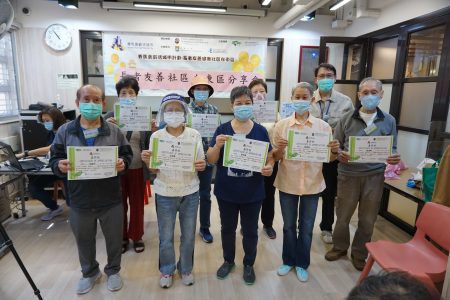Jockey Club Age-friendly City Project – HK East (Phase 2)



The Hong Kong Young Women’s Christian Association Ming Yue District Elderly Community Centre organised the Age-friendly City programme to improve age-friendliness in 1) respect and social inclusion, 2) community support and health services, and 3) social participation within the district with support from the Jockey Club Age-friendly City Project. This programme included two sections with a series of sub-programmes:
The first part of the progamme targeted community support and social inclusion of the caregivers. Advanced trainings were given to the ambassadors trained in 2018 in order to further consolidate their understanding of the difficulties faced by the older caregivers. The ambassadors also made home visits to the caregivers to understand their needs, as well as introduce the community resources and share the up-coming activities in the district with tablets. Regular gatherings at the elderly centre were organised providing physical fitness workshop and light snacks in order to promote better well-being for the caregivers.
For the second part of the programme, the main focus targeted chronic pain relief of the older adults. Assessments provided by health professionals, such as physiotherapists, were given to the members of the centre. Follow-up sessions were also given in order to provide regular check-ups. Workshop of exercises to relieve joint stiffness and pain was also organised so that older adults can do the practice at home after completed the sessions. Moreover, in order to encourage older adults to join the activities, they collected stamps for attending the activities so that they can exchange for some rewards at the end of the programme.
Main target group: Older people in general
Other target group(s): The general public
Sector(s): Health, Information and communication
Desired outcome for older people:
Meet their basic needs